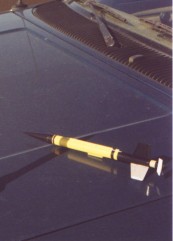| Manufacturer: | Clone |
 Brief:
Brief:
This is a simple sport scale model of the WAC Corporal sounding rocket developed by CALTECH and JPL in 1945.
Construction:
- 1 Body tube - Estes BT-20 8.65 inches long
- 3 fins - 1/16in basswood
- 1 Conical balsa nose cone
- 1 Motor mount - Estes BT-5 2 inches long
- 1 1/8in launch lug - Estes 1.25 inches long
- 1 Conduit 1/8in balsa strip
- 1 Streamer - 24in x 1.75 inches Mylar
- 2 Centering rings - Estes BT-20
- 1 Engine block - Estes BT-5
- 1 Shock cord - 14in x 1/8 inches
 When I was eleven I had a WAC Corporal that was produced by Estes, kit K-11. I enjoyed it very much and had many flights with it until I overpacked the wadding. This past year I decided to make a clone of the kit.
When I was eleven I had a WAC Corporal that was produced by Estes, kit K-11. I enjoyed it very much and had many flights with it until I overpacked the wadding. This past year I decided to make a clone of the kit.
The first place I went was Jimz plan site. I download the plans to the Estes kit K-11. I also pulled out my copy of "Rockets of the World" by Peter Alway. I made a copy of the drawing and started to do the math on the dimensions. I also found several color photos on the web. I printed these out and set them aside for reference. I tried to base most of the dimensions for this rocket off of Peter Alway's drawings.
I found a nose cone in a local hobby shop that was the same balsa cone that came in the original kit. This meant that I was going to use an Estes BT-20 body tube. Using the drawings and the body tube, the scale came out to 1/16.21. The body tube was cut to 8.65 inches.
The original kit called for using the conduit on the side of the rocket as the position for the launch lug. I thought that this distracted from the scale appearance of the rocket. I repositioned the launch lug to the opposite side of the body tube. I fashioned a new conduit from balsa. The total length of the conduit is 4.75in. I used 1/8in balsa for the conduit. I rounded the conduit and sanded and tapered the ends.
The fins were next the item on my list. These were made from 1/16in basswood. I used basswood because it is harder and has a finer grain then balsa. I felt it would stand up to more launches and would be easier to seal. For the overall dimensions of the fins I used the drawings from "Rockets of the World". I used the dimensions of the taper in the airfoil listed in the Estes planes. I used a water based wood sealer to sand and seal the fins before I attached them to the body.
In the Estes plans they use the body tube for the motor mount. I thought that a 18mm motor would be too large for this size of a rocket. I decided to use an Estes BT-5 tube for the motor mount. This would allow me to fly small motors in small fields or use the A10 motor to fly the rocket higher. The motor tube length is 2 inches. I used an engine block instead of the motor hook called for in the Estes plans.
I used a 14in x 1/8in shock cord. The original plan called for a 12-inch parachute. I flew this rocket about eight times with this chute. I found that this carried the rocket too far away from the launch site. I then used a 1.75 X 24 inch Mylar streamer; this keeps the rocket closer to the launch site.
I used an eyehook to hold a six-gram lead weight to the back of the nose cone to add weight and hold the shock cord to the nose cone.
In the original kit plans it calls for painting the rocket white with black stripes. In Peter Alway's drawing and on the web the only color is yellow. I have found that many people are still painting WAC Corporals white. I think it shows you how much influence a kit can have on people. I started by spraying a base of white sandable primer. This was followed by the yellow. Using the drawings and the photos from the web I measured the size and the spacing of the stripes. These were masked off using blue painters tape. I prefer this tape to Scotch tape. For me it is easier to use, because the adhesive is less tacky than Scotch tape. The black was sprayed on using several light coats. After the last coat was partially dry, I removed the blue masking tape. For the steel fins, I used Tester's steel non-buffing metalizer. This I hand brushed using a 1/4in brush. I used very light coats and waited for the paint to be dry between coats. For the 3in strip of duct tape down the side of the conduit, I hand brushed Tester's dull dark gray, using and thin brush.
Flight:
The original kit used the body tube for the motor mount. This meant using 18mm motors, however, I made this kit for 13mm motors. I have flown this rocket this rocket several times. I have flown it on 1/4A3s, 1/2A3s, A3s and A10s. This rocket flies very well on all of these motors. I haven't tracked the actual altitude of these launches but I have run them in RockSim. The heights are as follows: 1/4A3 = 63ft, 1/2A3 = 194ft, A3 = 202ft, and A10 = 490ft. I have sustained damage in these flights of one zipper and had the nose come back and hit one of the fins and put a dent in it.
Summary:
Overall this rocket is a fun rocket to clone. There is plenty of room to add scale detail. As I have built this rocket it would fit in the Sport Scale class. If desired a Tiny Tim booster could be added to this rocket and it could fly even higher. The WAC Corporal is a very easy rocket to make.
Related Products
 |
 |